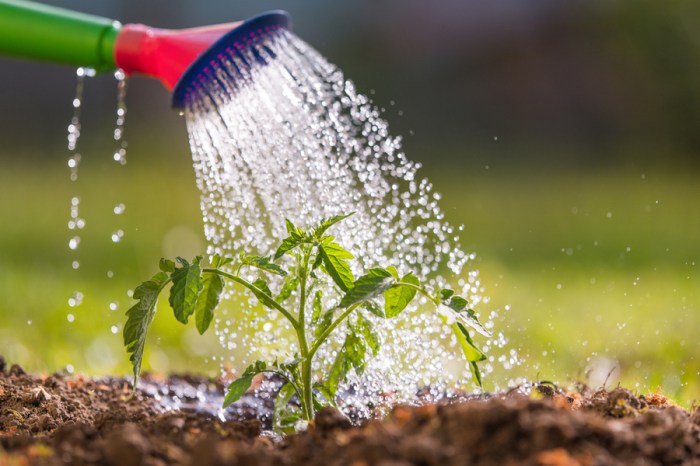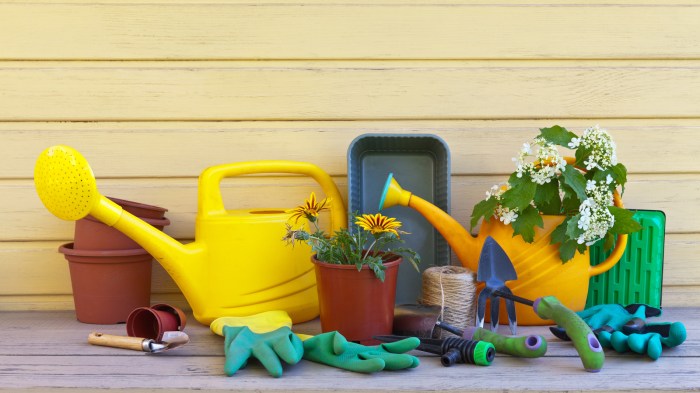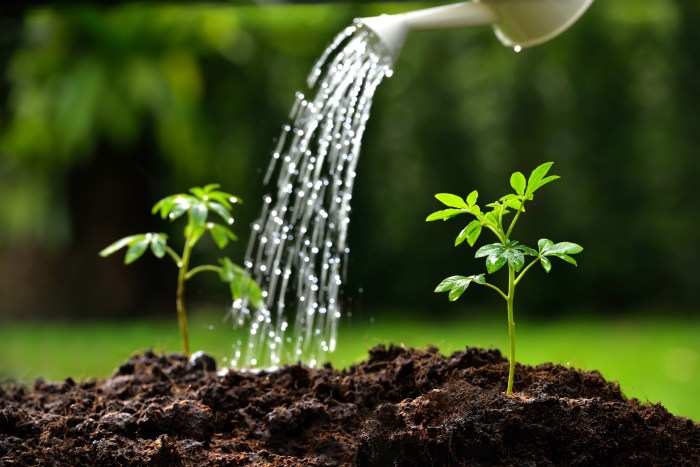HOA watering violations – it’s a topic that can spark heated debates amongst homeowners. While some see these restrictions as an infringement on their property rights, others understand the need for water conservation and a well-maintained community. But what exactly are these violations, and how can you avoid getting caught in the crosshairs?
This blog delves into the world of HOA watering restrictions, exploring the reasons behind them, the various types of violations, and how to navigate this tricky terrain. We’ll uncover the common causes of violations, the dispute resolution process, and the potential impact on your community.
And, of course, we’ll equip you with practical tips and strategies to ensure your lawn stays green while staying on the right side of the HOA.
HOA Watering Restrictions

Homeowners’ Associations (HOAs) often implement watering restrictions to conserve water and maintain the health and appearance of the community’s landscape. These restrictions can vary depending on the region, local water conditions, and the specific HOA guidelines.
HOA watering violations can be a real pain, especially when you’re trying to keep your lawn looking lush and green. But sometimes, you just want to relax and enjoy your backyard. If you’re thinking about adding a firepit to your space, you might wonder can you have a firepit under a gazebo.
Of course, you’ll need to check your HOA rules first. But if it’s allowed, it could be a great way to add a cozy touch to your outdoor living area, even if you can’t always water your lawn as much as you’d like.
Reasons for Watering Restrictions
HOAs implement watering restrictions for several reasons, primarily focused on resource conservation and landscape health.
- Water Conservation:HOAs are increasingly concerned about water scarcity and its impact on the environment. Restrictions help reduce overall water consumption, ensuring a sustainable water supply for the community.
- Landscape Health:Excessive watering can lead to root rot, fungal diseases, and other problems that can damage plants. Watering restrictions promote healthy root development and reduce the risk of these issues.
- Cost Savings:By reducing water usage, HOAs can lower their overall water bills, potentially passing savings onto residents.
- Environmental Protection:Water conservation is crucial for protecting local ecosystems, especially in areas experiencing drought or water shortages.
Benefits of Watering Restrictions
Watering restrictions have several benefits, impacting both the community and the environment.
- Reduced Water Bills:Lower water consumption translates to lower water bills for residents, potentially reducing overall expenses.
- Improved Landscape Health:Proper watering promotes healthy plant growth, leading to a more vibrant and visually appealing community landscape.
- Protection of Local Ecosystems:Conserving water resources helps protect local ecosystems and prevent water shortages, ensuring the sustainability of the environment.
- Enhanced Community Sustainability:By promoting responsible water usage, HOAs contribute to the overall sustainability of the community, ensuring a healthier and more resilient environment for future generations.
Typical Watering Schedules and Restrictions
HOA guidelines often include specific watering schedules and restrictions, tailored to the local climate and water conditions.
It’s frustrating when your HOA comes knocking because of watering violations, especially when you’re trying to cultivate a beautiful garden. If you’re aiming for vibrant blooms, you might want to consider planting floribunda roses, known for their abundant clusters of flowers.
You can learn more about how to grow floribunda roses and their water requirements, which could help you avoid future HOA complaints. Just remember to check your local watering restrictions to ensure you’re following the rules.
- Watering Days:Some HOAs restrict watering to specific days of the week, such as allowing watering only on Tuesdays and Saturdays. This helps to ensure that everyone waters on designated days, preventing overuse and maximizing water efficiency.
- Watering Times:To minimize water loss due to evaporation, some HOAs restrict watering to specific times of the day, such as early morning or late evening. This allows the water to soak into the soil before it evaporates in the heat of the day.
- Watering Duration:HOAs may set limits on how long residents can water their lawns, such as restricting watering to 15-20 minutes per zone. This helps prevent overwatering and ensures that the water reaches the roots effectively.
- Water-Efficient Irrigation Systems:Many HOAs encourage the use of water-efficient irrigation systems, such as drip irrigation or soaker hoses, which deliver water directly to the roots and reduce evaporation.
- Water Restrictions During Drought:During periods of drought, HOAs may implement stricter water restrictions, such as reducing watering days or limiting the amount of water that can be used. These measures help conserve water during critical periods and protect the community’s water supply.
Types of Watering Violations

Watering restrictions are designed to conserve water and protect our community’s resources. Understanding the different types of violations and their consequences is essential to avoid fines and ensure compliance.
Watering During Prohibited Times
Watering during prohibited times is a common violation. Each community has specific days and times when watering is allowed. For example, some communities might prohibit watering between certain hours during the day or on specific days of the week. Exceeding the allotted watering times, such as watering for longer than the allowed duration, can also be considered a violation.
- Consequences:Depending on the severity of the violation, consequences can range from a warning to a fine. Repeated violations can lead to escalating fines and even legal action.
Watering on Prohibited Days
Watering on prohibited days is another violation that often occurs due to oversight. Many communities have specific days when watering is restricted, usually to reduce water usage during peak demand periods.
- Consequences:Similar to watering during prohibited times, violating watering restrictions on prohibited days can result in warnings, fines, and legal action.
Using Inefficient Irrigation Methods
Using inefficient irrigation methods can waste water and contribute to higher water bills. This includes using sprinklers that spray water onto sidewalks, driveways, or other non-plant areas.
- Consequences:While this may not be explicitly prohibited in all communities, it can lead to warnings or fines for wasting water resources.
Other Violations
Besides the above, other violations can occur, such as:
| Violation Type | Description | Potential Consequences |
|---|---|---|
| Overwatering | Watering plants excessively, leading to waterlogging and root damage. | Warnings, fines, potential damage to landscaping. |
| Using Water-Intensive Plants | Planting species that require excessive water in a water-restricted area. | Warnings, fines, potential landscaping adjustments. |
| Failing to Repair Leaky Irrigation Systems | Neglecting to repair leaks in sprinklers or irrigation systems, wasting water. | Warnings, fines, potential damage to landscaping. |
Common Causes of Watering Violations

It’s easy to get caught up in the routine of watering your lawn and forget about the HOA’s watering restrictions. However, even the most well-intentioned homeowner can unknowingly break the rules. Understanding the common causes of watering violations can help you avoid them and maintain a harmonious relationship with your HOA.
Misunderstandings of HOA Guidelines
It’s essential to thoroughly read and understand your HOA’s watering restrictions. Misinterpretations can easily occur, leading to unintentional violations. For example, the guidelines may specify watering days or times, but homeowners might not be aware of these details.
- Watering days and times:Many HOAs restrict watering to specific days and times to conserve water and minimize runoff. Some homeowners might not be aware of these restrictions or might misinterpret them, leading to violations. For instance, they might water on a prohibited day or during a restricted time.
- Watering duration:HOAs often set limits on how long you can water your lawn. This could be a set number of minutes or a specific time frame. Misunderstanding these limitations can result in overwatering and exceeding the allotted watering time.
- Types of watering methods:Some HOAs require specific watering methods, such as using drip irrigation or soaker hoses, to reduce water waste. Homeowners might not be aware of these requirements or might use a prohibited method, leading to a violation.
Weather Fluctuations and Equipment Malfunctions
Even when homeowners are familiar with the HOA’s watering restrictions, unpredictable weather and equipment malfunctions can contribute to violations.
- Unforeseen weather events:Sudden changes in weather, such as unexpected heat waves or heavy rainfall, can disrupt established watering schedules. Homeowners might need to adjust their watering frequency or duration to compensate for these fluctuations, potentially exceeding the HOA’s limits.
- Equipment malfunctions:Malfunctioning sprinklers or timers can lead to unintentional overwatering. A faulty sprinkler head might spray water onto sidewalks or streets, or a malfunctioning timer might activate the system for longer than intended. These problems can easily go unnoticed, resulting in a violation.
Dispute Resolution and Enforcement: Hoa Watering Violations
Resolving disputes related to watering violations involves a structured process to ensure fairness and consistency. HOAs typically have established procedures to address concerns and ensure compliance with watering restrictions.
Communication Channels
HOAs utilize various communication channels to connect with homeowners regarding watering violations. These channels facilitate transparency and ensure that homeowners are informed about any issues.
- Email:Email is a common and efficient way for HOAs to send out notices, reminders, and updates regarding watering restrictions and violations. This allows for quick dissemination of information and serves as a documented record of communication.
- Website:Many HOAs have dedicated websites where they post information about watering restrictions, violation procedures, and frequently asked questions. This provides a central hub for homeowners to access relevant information at their convenience.
- Community Bulletin Boards:Physical bulletin boards located in common areas of the community can be used to post notices, announcements, and reminders about watering restrictions. This provides a visual reminder for homeowners and fosters a sense of community awareness.
- Community Meetings:HOAs often hold regular community meetings where they discuss important issues, including watering restrictions and enforcement. These meetings allow homeowners to raise questions, express concerns, and receive updates from the HOA board.
- Phone Calls:In some cases, HOAs may contact homeowners directly via phone calls to address specific watering violations or to follow up on outstanding issues. This provides a more personalized approach to communication.
Role of Enforcement Officers
HOA enforcement officers play a crucial role in addressing watering violations. They are responsible for monitoring compliance with watering restrictions, investigating reports of violations, and taking appropriate action to resolve issues.
- Monitoring and Observation:Enforcement officers conduct regular patrols within the community to monitor compliance with watering restrictions. They observe watering schedules, identify potential violations, and document any observed discrepancies.
- Investigation and Documentation:When a violation is reported or observed, enforcement officers initiate an investigation. They gather evidence, such as photographs or witness statements, to document the violation and determine its severity.
- Notification and Communication:Once a violation has been confirmed, enforcement officers notify the homeowner in writing. This notification typically Artikels the nature of the violation, the relevant HOA rules, and the potential consequences of non-compliance.
- Dispute Resolution:Enforcement officers may facilitate communication between the homeowner and the HOA board to resolve disputes. They can provide guidance and assistance to both parties in reaching a mutually acceptable solution.
- Enforcement Actions:If a homeowner fails to address the violation after receiving notification, the HOA may take further enforcement actions. These actions could include fines, restrictions on water usage, or legal action in severe cases.
Impact of Watering Violations

Watering violations, while seemingly minor, can have significant consequences that extend beyond the individual homeowner. These violations not only impact water resources and landscape aesthetics but also affect the community as a whole, potentially creating tension and discord among neighbors.
Impact on Water Resources
Excessive watering practices contribute to water waste, a critical issue in many regions facing water scarcity. Frequent violations can lead to:
- Depletion of Groundwater:Excessive irrigation can deplete underground water reserves, leading to lower water tables and potentially impacting water availability for other uses, including drinking water.
- Increased Water Bills:Water waste translates to higher water bills for the community, as the cost of treating and distributing water is ultimately shared among residents.
- Strained Water Infrastructure:Overuse of water can put a strain on the local water infrastructure, leading to potential breakdowns and increased maintenance costs.
Impact on Landscape Aesthetics
While excessive watering may seem beneficial for lawns, it can actually have detrimental effects on the overall landscape:
- Disease and Pests:Overwatering creates ideal conditions for fungal diseases and pest infestations, leading to unhealthy and unsightly lawns and gardens.
- Reduced Turf Density:Overwatering can suffocate grass roots, leading to thinning turf and patches of bare ground.
- Runoff and Pollution:Excess water from overwatering can runoff into storm drains, carrying fertilizers and pesticides that pollute local waterways and harm aquatic life.
Impact on Neighbor Relationships, Hoa watering violations
Watering violations can create tension and conflict between neighbors, especially when they involve shared resources like common areas or irrigation systems:
- Disputes and Complaints:Neighbors may complain about excessive watering, leading to disputes and strained relationships.
- Erosion and Damage:Overwatering can lead to soil erosion and damage to shared landscaping, causing frustration and inconvenience for neighbors.
- Community Harmony:Recurring violations can contribute to a sense of dissatisfaction and undermine the overall community spirit and harmony.
Best Practices for Avoiding Violations

Navigating HOA watering restrictions can feel like a constant game of water-conservation chess. To avoid penalties and maintain a lush, healthy landscape, understanding and adhering to HOA guidelines is crucial. This means going beyond just knowing the rules – it’s about embracing proactive strategies and adopting water-wise practices that benefit your garden and your community.
Understanding HOA Guidelines
The first step to avoiding watering violations is to familiarize yourself with your HOA’s specific guidelines. These rules are usually Artikeld in your HOA’s governing documents or website. Take the time to thoroughly read and understand these documents, paying close attention to:
- Watering days and times: When are you allowed to water your lawn and landscaping? These times are often based on your address or street number, ensuring a staggered watering schedule that conserves water and reduces runoff.
- Watering duration: How long can you water for each session? This is often determined by the type of irrigation system you use and the type of landscaping you have.
- Water restrictions: Are there any specific restrictions on the type of water you can use, such as reclaimed water or greywater? Are there any limitations on using sprinklers during certain seasons?
- Exemptions: Are there any exceptions to the watering rules for specific plants, such as newly planted trees or drought-tolerant landscaping?
Using Water-Efficient Irrigation Systems
Investing in a water-efficient irrigation system is a smart move for both your wallet and the environment. These systems not only help you conserve water but also ensure you’re watering your lawn and landscaping effectively. Here are some options to consider:
- Drip irrigation: This system delivers water directly to the roots of plants, minimizing evaporation and runoff. It’s particularly effective for flowerbeds, shrubs, and trees.
- Soaker hoses: These hoses slowly release water over a long period, reducing evaporation and providing consistent moisture to your lawn and plants.
- Smart controllers: These controllers use sensors to monitor weather conditions and soil moisture, automatically adjusting watering schedules to ensure your lawn and landscaping receive the right amount of water.
Communicating with Your HOA
Don’t hesitate to reach out to your HOA if you have any questions or uncertainties about their watering restrictions. Open communication can prevent misunderstandings and ensure you’re following the rules correctly. Here are some tips for effective communication:
- Review your HOA’s communication channels: How does your HOA typically communicate with residents? Is it through email, a website, or a community newsletter? Familiarize yourself with these channels to stay informed.
- Contact the HOA board: If you have specific questions or concerns, don’t hesitate to contact your HOA board directly. They can provide clarification on the rules and address any issues you may have.
- Attend HOA meetings: Attending HOA meetings can provide valuable insights into community issues, including watering restrictions. It’s an opportunity to ask questions and voice your concerns.
Legal Considerations

HOA watering restrictions are not just a set of rules enforced by a community association; they are backed by legal frameworks that define the rights and responsibilities of both homeowners and HOAs. Understanding these legal considerations is crucial for homeowners to protect their rights and for HOAs to ensure their regulations are enforceable.
HOA’s Authority to Enforce Watering Restrictions
HOAs derive their authority to enforce watering restrictions from the governing documents that establish the community association. These documents, typically including the Declaration of Covenants, Conditions, and Restrictions (CC&Rs), bylaws, and articles of incorporation, Artikel the HOA’s power to regulate various aspects of community life, including water usage.The legal framework surrounding HOA watering restrictions is typically based on state laws that govern community associations.
These laws empower HOAs to create and enforce rules that maintain the aesthetic appeal, property values, and overall well-being of the community.
Homeowners’ Rights and Responsibilities
Homeowners, while subject to HOA regulations, also have certain rights. They are entitled to due process before facing any enforcement actions for watering violations. This includes the right to be notified of the violation, the opportunity to present their side of the story, and the chance to appeal any decision.However, homeowners also have a responsibility to comply with the HOA’s established watering restrictions.
Failure to comply can lead to fines, liens, or other legal actions.
Legal Cases and Precedents
Numerous legal cases have addressed disputes related to HOA watering restrictions. One notable example is the case ofSmith v. The Pines Homeowners Association*, where a homeowner challenged the HOA’s enforcement of watering restrictions during a severe drought. The court ultimately upheld the HOA’s authority to enforce these restrictions, recognizing the importance of water conservation in times of scarcity.Another significant case isJones v.
Willow Creek HOA*, where a homeowner argued that the HOA’s watering restrictions were overly restrictive and unreasonable. The court found in favor of the homeowner, concluding that the HOA’s rules did not strike a fair balance between community interests and individual property rights.These cases illustrate the complexities of legal disputes related to HOA watering restrictions.
Homeowners should be aware of their rights and responsibilities, while HOAs must ensure their rules are reasonable and enforceable within the legal framework.
Closing Summary

Navigating HOA watering restrictions can feel like a delicate dance. But by understanding the rules, utilizing water-efficient practices, and maintaining open communication with your HOA, you can keep your lawn lush and your neighbors content. Remember, a well-maintained community benefits everyone, and a little cooperation goes a long way towards fostering a harmonious living environment.